Estimated reading time: 6 minutes
I’ve been observing the squirrels in my yard and neighborhood this past week as the temperatures have become more fall-like. They are busy!
Fascinated, I did a little research on the common gray squirrel. Squirrels don’t hibernate in the winter, but they do spend far less time foraging outside their dens in the colder months. Several squirrels often share a den for the winter, a process that allows them to share food and shelter and to keep each other warm.
During the transitional months of fall, squirrels busy themselves with caching. Also called hoarding, caching is storing stashes of food for later. Squirrels often pile their food in a shallow hole and then cover it up for safekeeping until they need it.
Squirrels also prepare themselves for winter by eating more and increasing their body mass. This extra body fat will help them survive in the leaner months of winter.
Apart from being interesting, what does this information have to do with homesteaders? A lot! We would do well to prepare for winter as thoroughly as the squirrels.
Want to save this post for later? Click Here to Pin It on Pinterest!
Here are 20 items homesteaders need to stockpile for winter.
1. Enough Non-Perishable Food to Last Three Weeks
Although this is a good practice for any time of year, it is especially important during winter when a storm could knock out your power. Items to consider include canned foods, cereals, peanut butter, crackers, dried fruit, nuts, rice, beans, canned juice and any other foods with a long shelf life.
Be sure you have a hand-operated can opener to open those cans.
2. Water for Three Weeks
The American Red Cross recommends that you store a minimum of one gallon of water per person per day for emergency preparedness. Keep in mind that you need water for drinking, cooking, and for hygiene purposes.
You’ll need even more water for your animals (cows and horses drink a lot.) Use five-gallon buckets to collect water and ice to supplement your water supply.
3. Firewood and Fuel
Don’t be caught in a winter storm with too little firewood or not enough fuel. Store a full tank of heating fuel and a large supply of wood for your wood stoves.
4. Lighting Supplies
You should stockpile candles, lanterns, lantern fuel, flashlights and flashlight batteries for the winter.
Consider hand-powered or solar-powered lights and make sure you have matches and lighters as well. Aim to keep at least one flashlight or small battery-operated lantern in every room of the house.
5. Common Household and Personal Supplies
What you stockpile depends on the needs of your household. Some products to consider are batteries, diapers, toilet paper, diapers, women’s hygiene products, and kitty litter.
Don’t forget other personal items or toiletries such as shampoo, deodorant, and toothpaste.
6. Bedding
Not only do you need enough blankets, sheets, pillows, and sleeping bags for your family’s needs, but you will want extras set aside to help seal off hallways, doorways, and stairways.
7. Laundry Supplies
You’ll want soap to wash your wardrobe essentials and a rope to let them hang dry. Hanging wet laundry acts as an important humidifying agent during the winter.
8. Warm Clothes, Coats, Hats, and Shoes
Keep cold-weather gear, including boots and hand-warmers, stashed in your car for emergencies. They will help keep you warm if you get stranded during a storm. You may need them around the house in a lengthy power outage as well.
9. Sand and Shovels
Having sand (or kitty litter) and a shovel can be helpful for giving your vehicle traction in ice and snow.
10. Food for Animals
Don’t forget your furry friends. Stockpile as much food, grain, and hay as you can for your pets and livestock this winter.
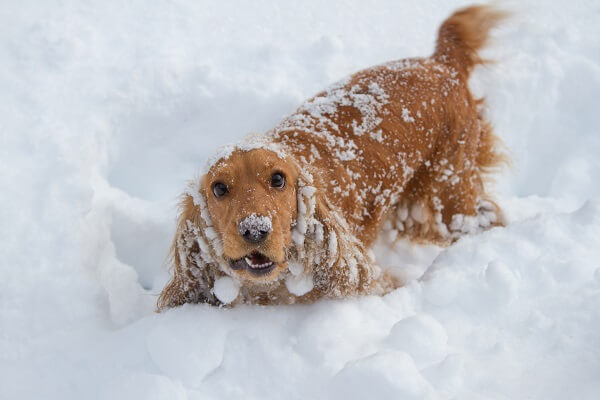
11. Hand-Crank or Battery-Powered Radio
One of these radios can be a lifesaver in a lengthy power outage. Hand crank radios don't always work as well, but it's nice not to have to worry about batteries.
12. First Aid Kit
Make sure your first aid supplies are stocked up. You may not be able to get to the pharmacy or even to the hospital in a bad winter storm. Some items to include in your kit include:
- Sterile gloves
- Adhesive bandages and other dressings
- Antibiotic wipes
- Antibiotic ointment
- Eyewash solution
- Thermometer
- Glucose and blood pressure monitoring equipment (if needed)
- Over the counter medications such as pain relievers, stomach soothers and antacid
- Scissors, tweezers
13. Prescription Medications
If you or a family member regularly take medications, it’s a good idea to have a seven-day supply on hand in case of emergency. Also consider other health-related items such as contact lenses and lens solution, syringes and hearing aid batteries.
14. Backup Power Generator
Generators are a big expense, but if you live in an area with severe weather, they can give you some peace of mind. A backup generator will help you have hot water and cold food when a storm knocks out your electrical power.
15. Gassed Up Vehicles
Aim to keep the gas tanks filled in your cars and trucks. During severe weather, not only might it be difficult to get to a gas station, but your local stations may run out of gas.
16. Plastic Sheeting and Duct Tape
These inexpensive but important supplies will help you create an emergency shelter if needed.
17. Household Chlorine Bleach and Medicine Dropper
You can treat contaminated water by placing 16 drops of household liquid bleach in a gallon of water.
18. Books and Games
Store activities your family will use to pass the time during a lengthy power outage. Don’t forget paper, pens, markers, and crayons.
19. Paper Supplies
Have a supply of paper towels, paper cups, plates, and plastic utensils on hand to use in case water is in short supply.
20. Battery Chargers for Electronics
Purchase and use battery packs for your phones and laptop and try to keep your electronics fully charged when a winter storm is nearing.
Like this post? Don't Forget to Pin It On Pinterest!

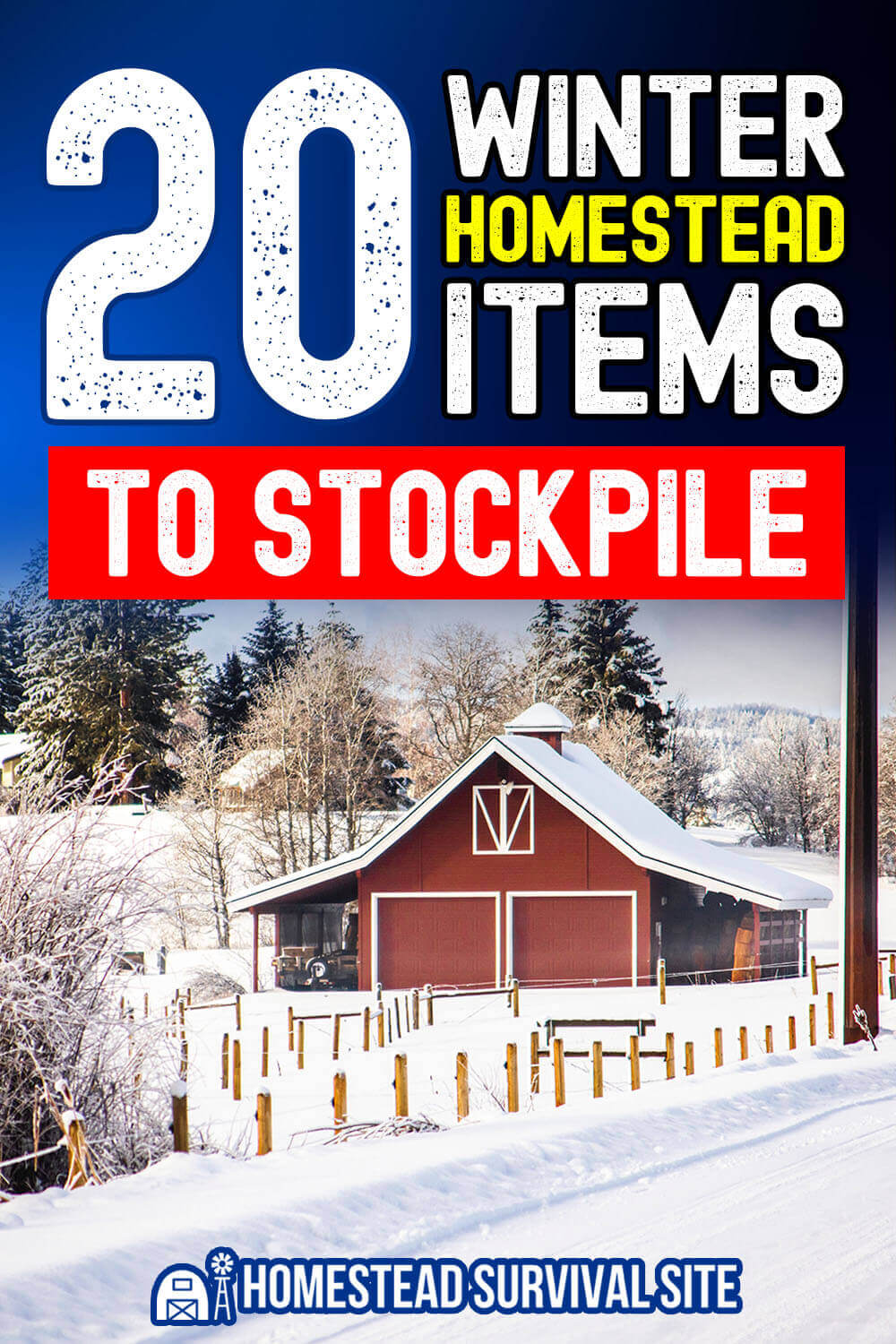


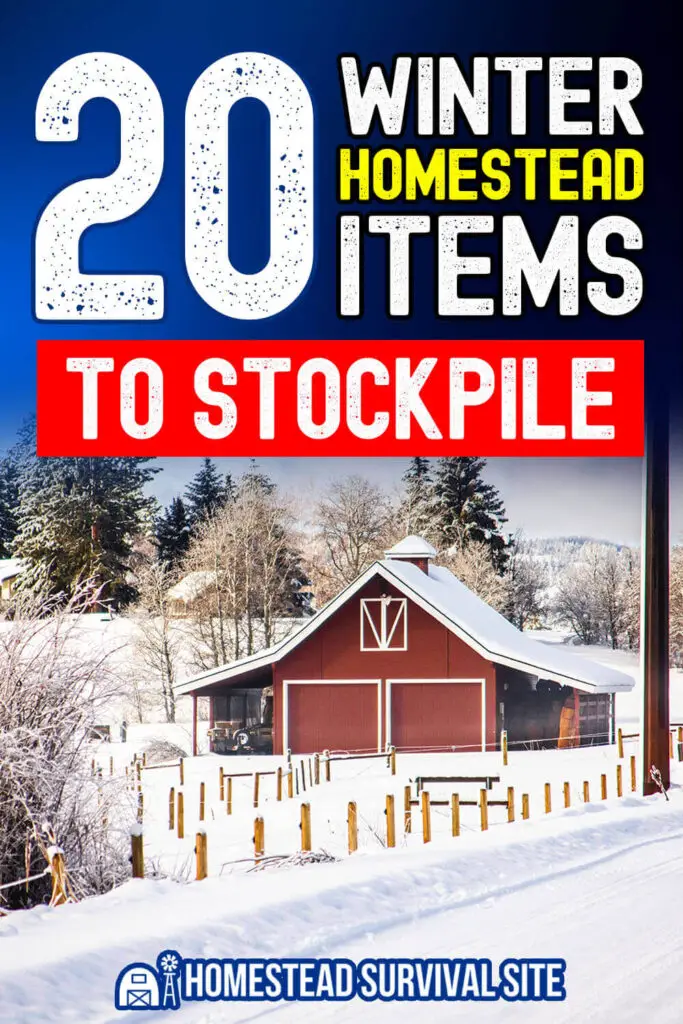

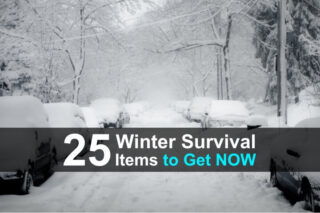
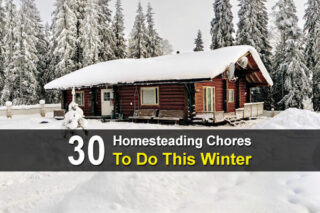
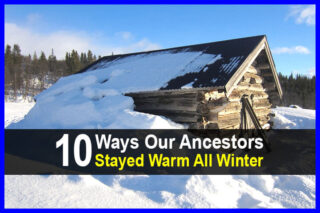
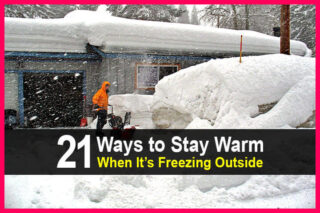




Should do for 7-10
From living in FL, MS, LA we learned any emergency we needed more than 3 days
He said 3 weeks not days
This is an excellent post. I am one of those people who love to be prepared as I do not like surprises and this post contained some items I hadn’t thought of. Thanks
I’m curious what kind of homesteader only has 3 days of NON-perishable food on hand? I had to reread this post a couple times just to be sure the author did not intend to write 3 weeks. Three days will never be enough if you’re in snow county where you can experience 24” snowfalls. (That’s most of NE, a lot of the NW, upper Midwest, Rockies, etc) The same would apply to tornado prone areas and coastal hurricane prone areas. I grew up in rural VT, lived in GA, Houston, CT, and OR and have lived through 36” snowfalls and horrific ice storms in VT, 30” snowfalls and hurricane Irene in CT, ice storms and hurricanes in GA, and Harvey and two major flood events in TX since moving here. Almost all of these knocked out power and roads for days. Please think weeks, not days.
You’re right, it should definitely say three weeks. I didn’t write this article, but I published it a while back so I don’t remember my thought process. I think maybe I just didn’t edit it carefully enough. I will update it.
This is a great list. I am not a homesteader but these items are good for people living anywhere. I would add to the first aid list pain relievers & cold/flu items. I’ve been caught without and living in a semi-rural area I could not make it to a store to get something, if they would be open. It’s always the most inconvenient time that these things hit!
And don’t forget to put your snow tires on for the winter!
Don’t forget herbs/supplements, for those of us who depend on them!!! And if you are like me, be sure to have lots of stuff for itching if it should decide to attack! Also any medications or first aid items for pets!
i LIVE IN tEXAS WE MIGHT GET AWAY WITH 3 DAYS. ILL TAKE 3 WEEKS MYSELF WERE 85 TODAY YOMORROW WELL BE 43.
Good article to start with. I live off grid and when power goes out you better be ready. I use solar and generator. My generator runs from 9am to midnight. It runs 5 gallons a day so store a lot of gas. Solar works great in the Mohave desert but if you live up north like I did, it can be testy in the winter. I see people put solar panels on 2-3 story homes and lose solar because they cannot clean the snow off. I see a lot of comments about food storage. My advice is grow and store as much as you can to solve that issue.